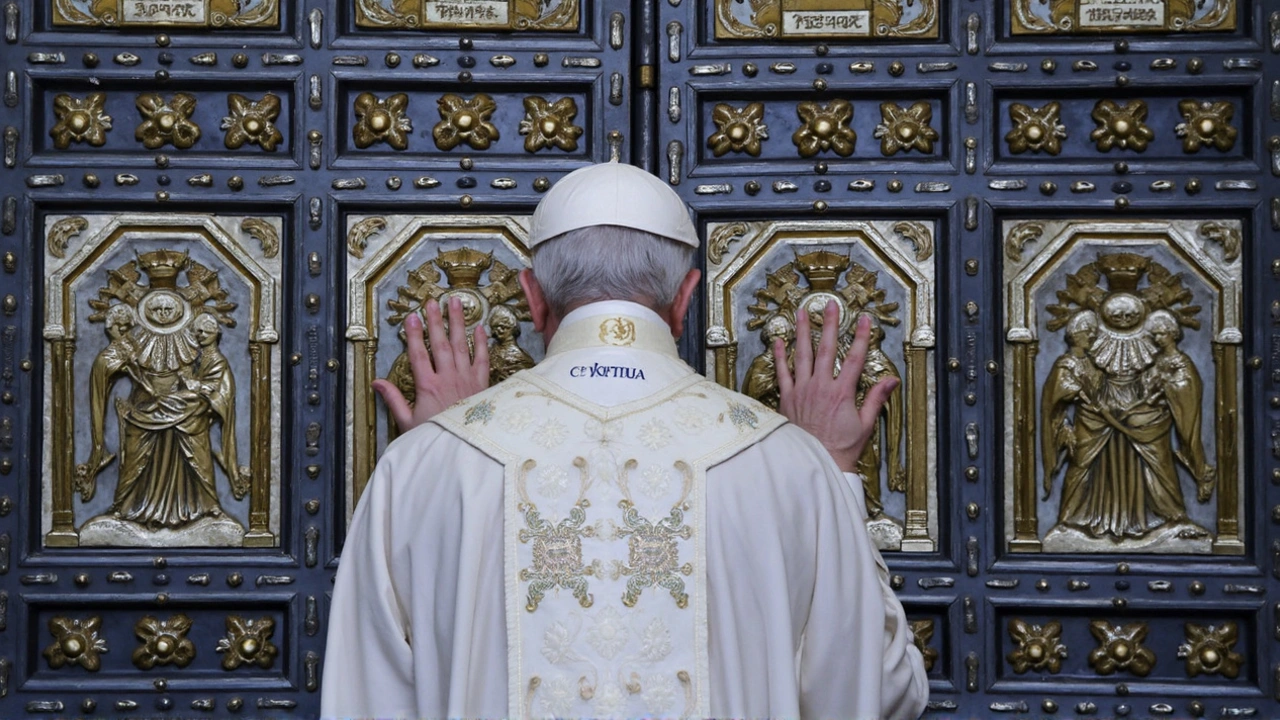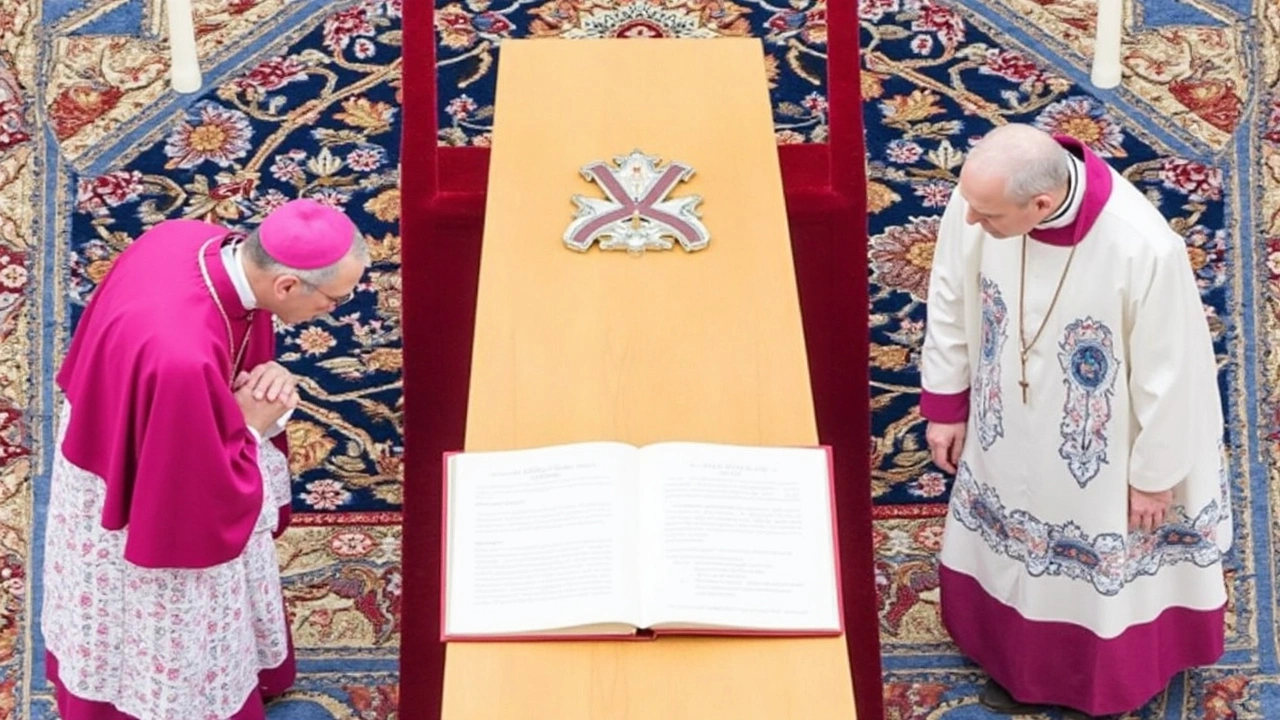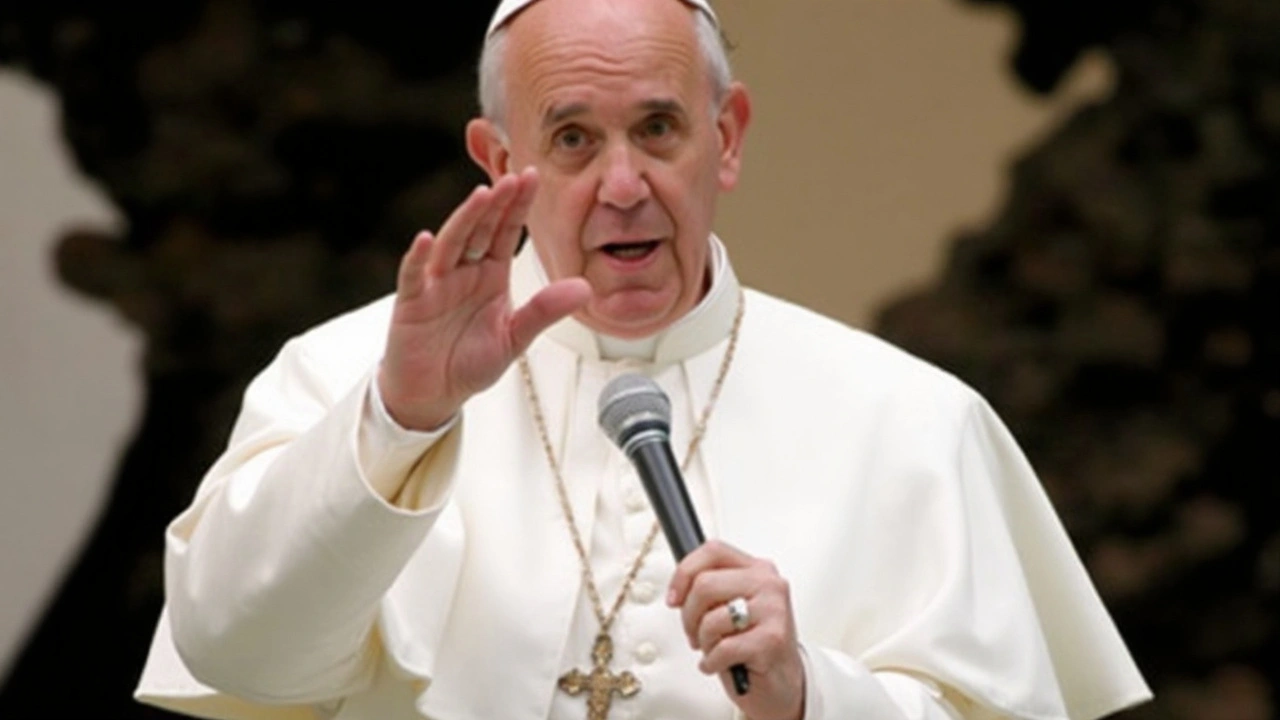 Apr, 21 2025
Apr, 21 2025
Pope Francis' Passing Ignites a New Papal Race
Nothing sends shockwaves through the Catholic world quite like the death of a pope. With Pope Francis' death landing on Easter Monday, the Vatican is quickly turning from mourning to serious planning. All eyes are now on Rome as the College of Cardinals prepares for a secretive and tradition-heavy process known as the conclave. Choosing a new pope is never just about religion—it's about global influence, church directions, and sometimes, a surprise twist.
The Catholic Church hasn’t had to do this since 2013, when the College delivered an unexpected decision, choosing Jorge Bergoglio—a little-known cardinal from Argentina who became Pope Francis. The ensuing years saw Francis shake up the Church, advancing a reformist style and challenging the status quo. Now, the big question is whether his vision will continue or if the Cardinals will apply the brakes.

How the Conclave Unfolds: Rules, Rituals, and Rounds
After a pope’s funeral, it’s not straight into voting. First comes a nine-day novena—a period marked by formal prayers, tributes, and the arrival of all eligible cardinals in Rome. Only after this sacred pause does the real process begin. All cardinals under the age of 80 are sequestered inside the Vatican’s Sistine Chapel, banned from phones and completely cut off from the outside world. Tradition, secrecy, and strict rules reign; even brief leaks are out of the question.
Technically any baptized Catholic man can become pope, but for the last 700 years, popes have always come from the College of Cardinals. Their deliberations are as mysterious as ever. Voting proceeds through rounds, each followed by a burning of ballots. Black smoke signals deadlock. White smoke, fluttering from the Sistine Chapel’s chimney, tells the world a new leader has been chosen. The twist? The man elected can actually refuse the job—a rule that adds yet another layer of suspense to the process.
The process is not merely a ritual. It’s a high-stakes election where alliances, ideologies, and personalities collide—sometimes yielding an expected winner, but often surprising even Vatican insiders.

Meet the Contenders: Familiar Faces and Wild Cards
This year’s list of likely frontrunners comes packed with both continuity choices and potential agents of change. The early favorite is Cardinal Pietro Parolin, Italy’s Vatican Secretary of State. Parolin is no stranger to global diplomacy and, as Francis’ right-hand man, represents an endorsement of current reforms.
Other contenders bring different backgrounds and priorities. Archbishop Pierbattista Pizzaballa, known for his work in tricky Middle East negotiations, could offer a pope with a keen eye on international hotspots. On another front is Cardinal Peter Turkson from Ghana, who previously led the Vatican’s office dealing with global development. If elected, Turkson would be the first African pope in over a millennium, a decision that would signal real change for a worldwide church.
The list goes on. Canadian Cardinal Marc Ouellet is experienced but recently retired, while Archbishop Rino Fisichella has made his mark with evangelization efforts. Ivan Gugerotti is known as a steady diplomatic hand, having been consulted on the Church’s response to the war in Ukraine.
- Pietro Parolin: Steady, diplomatic, and respected insider.
- Pierbattista Pizzaballa: Grounded in conflict resolution, especially in the often-tense Holy Land.
- Peter Turkson: Represents global South, with a focus on social development.
- Rino Fisichella: Connected to modern evangelization efforts.
- Marc Ouellet: Experienced but possibly viewed as a traditionalist.
- Ivan Gugerotti: Known for his work on Ukraine-Russia, showing a diplomatic edge and international awareness.
Picking a new pope is never a simple choice between a few names. The cardinals’ votes are deeply personal and political. They weigh not just the candidates' beliefs or skills, but also the direction they want the Church to take. Do they double down on Francis' reforms? Do they favor stability and a return to traditionalism? Or do they chart a completely unexpected course?
With all the secrecy and ceremony, predicting the next pope is as much art as science. History has proven that anything can happen behind those closed Vatican doors. For the world’s 1.3 billion Catholics, and plenty of curious onlookers, every twist in the process is impossible to ignore.

Douglas Gnesda
April 21, 2025 AT 21:13Wow, the conclave process is a fascinating blend of canonical law, diplomatic protocol, and centuries‑old tradition. The way the cardinals are sequestered reminds me of a high‑stakes political summit, only with incense and Latin prayers. It's interesting how the voting mechanics-black smoke for stalemate, white for success-create a dramatic narrative for the world outside. The Vatican's emphasis on secrecy also highlights the tension between transparency and the mystique of the Holy See.
Abhijit Pimpale
April 27, 2025 AT 06:04The article incorrectly states that any baptized Catholic man can become pope; canon law actually requires the candidate to be a bishop, though a priest can be ordained after election.
Eric DE FONDAUMIERE
May 2, 2025 AT 14:54Yo, this whole conclave hype is like a secret reality show! The cardinals are basically locked in the Sistine Chapel, and we’re all waiting for that white smoke like it’s a season finale. Can't wait to see which one steps up to the mic! Let’s hope they pick someone fresh, not just same old guard.
Pauline Herrin
May 7, 2025 AT 23:44While enthusiasm is commendable, it is essential to remember that the papal election is a solemn ecclesiastical function, not a spectacle. The analysis ought to respect the gravitas of the tradition rather than reduce it to entertainment.
pradeep kumar
May 13, 2025 AT 08:35Another round of political maneuvering disguised as spiritual duty; the Vatican’s penchant for drama never ceases.
love monster
May 18, 2025 AT 17:25Hey, let’s keep things cool. The conclave is a chance for the Church to reflect on its future direction, and it’s worth watching how the cardinals balance tradition with the need for renewal.
Christian Barthelt
May 24, 2025 AT 02:16Honestly, the piece glosses over the serious canonical criteria. It’s not just about who’s popular; there are strict age and ordination requirements that the author seems to have ignored.
Ify Okocha
May 29, 2025 AT 11:06The article’s optimism is misplaced; the conclave will inevitably be a power play among factions, with little regard for doctrinal depth. Expect more backroom deals than spiritual insight.
William Anderson
June 3, 2025 AT 19:57Such a dramatic portrayal of the smoke signals-one moment you think the world is about to change, the next you’re left with the same old hierarchy. The spectacle often masks the slow, incremental reforms that actually happen.
Sherri Gassaway
June 9, 2025 AT 04:47Is it not fascinating how the very act of waiting for smoke becomes a metaphor for humanity's search for meaning? The silence of the chapel echoes louder than any proclamation could.
Milo Cado
June 14, 2025 AT 13:37Let's stay hopeful! The conclave could usher in fresh perspectives that address modern challenges while keeping the core values of the Church alive. It’s an opportunity for unity, and I’m optimistic we’ll see a leader who bridges tradition and progress.
MONA RAMIDI
June 19, 2025 AT 22:28Honestly, all this hype is just empty drama. If they pick a pope who actually does something, great; if not, it's the same old story, and I'm over it.
grace riehman
June 25, 2025 AT 07:18Hey friends, let’s remember that the Church is a global family. No matter who is chosen, we should support each other and celebrate our shared faith.
Vinay Upadhyay
June 30, 2025 AT 16:09The article’s romanticized view of the conclave is laughably naive. First, the cardinals are seasoned diplomats, not mystical seers; their decisions are heavily influenced by geopolitical considerations. Second, the "black smoke" drama is a well‑orchestrated PR stunt, designed to keep the faithful engaged while the real negotiations happen behind locked doors. Third, the notion that a pope can simply refuse the election is more theoretical than practical; historically, candidates have always accepted out of obedience. Fourth, the supposed "global South" surge is a buzzword that ignores the Vatican’s entrenched Eurocentric power structures. Fifth, the mention of "white smoke" as a simple victory glosses over the weeks of dead‑locked ballots that often precede it. Sixth, the emphasis on secrecy undermines transparency, which the modern world increasingly demands. Seventh, the article fails to address the financial dimensions of a papal election, including the cost of securing the conclave venue. Eighth, the role of media coverage is downplayed, yet it shapes public perception far more than any internal ritual. Ninth, the claim that any baptized man could become pope overlooks canonical stipulations requiring episcopal ordination. Tenth, the narrative neglects the influence of the Roman Curia in steering the outcome. Eleventh, the piece romanticizes Pope Francis' reforms without acknowledging the resistance they face from traditionalist factions. Twelfth, while the white smoke is symbolic, the actual policy shifts come from the Vatican bureaucracy. Thirteenth, the article’s language is riddled with jargon, making it inaccessible to lay readers. Fourteenth, the assumption that the conclave will produce a "new direction" is speculative at best. Fifteenth, the overall tone betrays a sensationalist angle, prioritizing drama over doctrinal nuance. In short, the coverage is more spectacle than scholarship.
Eve Alice Malik
July 6, 2025 AT 00:59Curious how the whole process balances ancient ritual with modern expectations. It makes me wonder what kind of leadership style will appeal to cardinals from such diverse backgrounds.
Debbie Billingsley
July 11, 2025 AT 09:50Our nation needs a pope who respects traditional values and stands firm against secular encroachment. The Vatican should prioritize candidates who will defend our cultural heritage.
Patrick Van den Berghe
July 16, 2025 AT 18:40Interesting look at the conclave but missing many details
Josephine Gardiner
July 22, 2025 AT 03:31While the article provides an overview, a more thorough examination of the historical precedents would enrich the reader's understanding of the conclave's significance.
Jordan Fields
July 27, 2025 AT 12:21The piece lacks precision; facts must be checked.